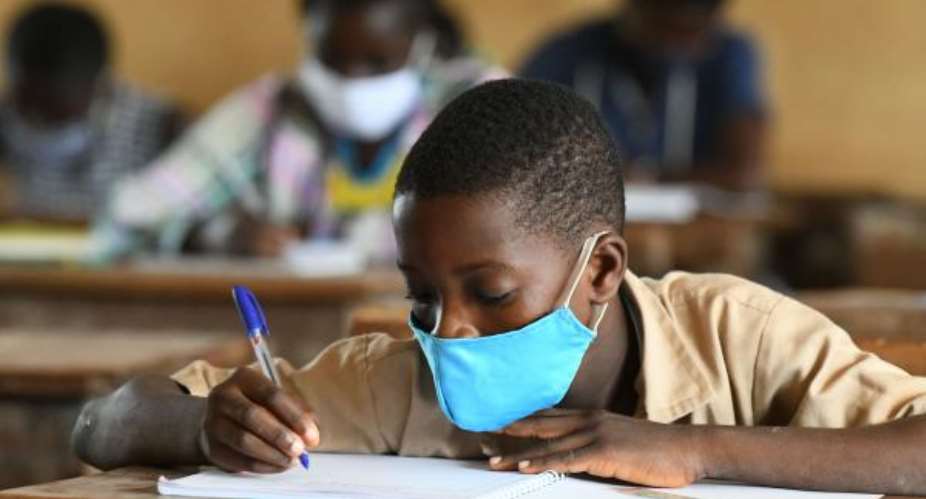International Literacy Day is celebrated annually on the 8th of September. The day was instituted by the United Nations Educational, Scientific, and Cultural Organisation (UNESCO) with the first celebration taken place in 1966. Since then, the day has been commemorated annually around the world under the auspices of UNESCO and member states to advance the literacy agenda at global, national, and regional levels.
Ghana joins the rest of the world to celebrate this important day in an eventful year on the global theme: “Literacy teaching and learning in the COVID-19 crisis and beyond” It is factual, every sector of human life has taken a hit from the COVID-19 pandemic and the impact has been dire. However, we cannot give in to the momentum of the pandemic. Closing our ranks and standing resolute against this virus which has disrupted every human endeavour especially education is the only way out.
Education is a matter of right and human dignity and plays a cardinal role in individual and national development. Indeed, no country can boast of development without referring to the key factor of education. This is succinctly stated by Thomas Jefferson the third American President, "A nation could never be ignorant and free".
At the height of the pandemic, schools had to be shut and students sent home culminating in the loss of physical contact hours. However, the Government quickly put in place virtual learning to ensure the continuity of teaching and learning. This is quite new to our educational architecture, as we are used to physical classroom teaching and learning. This is innovation responding to necessity.
Subsequently, the United Nations acknowledges the novelty made in a short time to ensure learning continuity proves that change can happen quickly. They have set the platform to reimagine education and build systems that are more forward-looking, inclusive, flexible and resilient.
The Government has invested substantially in E-learning. These are among raft measures to place education at the forefront of recovery agendas and protect the investment in education. Despite public spending constraints, Governments are urged by the United Nations to protect education budgets and include it in COVID stimulus packages.
Basic schools are to reopen in January 2021. Hence, parents are urged to play their supervising role to ensure the children stick and stay to the various e-learning platforms seriously to stem the tide of erasing decades of progress made in education. Accordingly, the UN Secretary-General Mr. Antonio Guterres warns of education catastrophe, pointing to UNESCO estimate of 24 million learners at risk of dropping out of school. Again, 24 million learners from pre-primary to tertiary education risk not finding their way back to their studies in 2020 following the COVID-19-induced closure. 5.3 per cent of these are in sub-Sahara Africa.
Despite the efforts by Governments around the world, globally, there are 773 million adults and young people who lack basic literacy skills. Furthermore, 617 million children and adolescent are not achieving minimum proficiency levels in reading and mathematics. This calls for concerted efforts to scale up basic literacy proficiencies skills.
It is insightful to state that, Adult education is ever relevant in the circumstance we find ourselves now. Scaling up messages ahead of the pandemic calls for literacy in varied languages. This is where the Non-Formal Education Division comes in handy and remains ever relevant to speed up the dissemination of safety messages to help cut back on the spread of the virus.
Despite the rage of COVID-19, let those in the education fraternity pact themselves on the shoulder for a job well done for ensuring continuity of teaching and learning. Your relentless and selfless service has ensured the out-of-school Ghanaian is not left deaf, mute, and dim to the pervasive opportunities education has to offer. Because education is a social responsibility to those whose feeling of hopelessness is heightened by less access to quality education.
Let us keep our heads above the torrents of COVID in our service to humanity. Post-COVID-19 we will look back with pride and say, education won.
Ayekoo to all in the education fraternity.





 We’ll no longer tolerate your empty, unwarranted attacks – TUC blasts Prof Adei
We’ll no longer tolerate your empty, unwarranted attacks – TUC blasts Prof Adei
 Bawumia donates GHc200,000 to support Madina fire victims
Bawumia donates GHc200,000 to support Madina fire victims
 IMF to disburse US$360million third tranche to Ghana without creditors MoU
IMF to disburse US$360million third tranche to Ghana without creditors MoU
 Truck owner share insights into train collision incident
Truck owner share insights into train collision incident
 Paramount chief of Bassare Traditional Area passes on
Paramount chief of Bassare Traditional Area passes on
 Two teachers in court over alleged illegal possession of BECE papers
Two teachers in court over alleged illegal possession of BECE papers
 Sunyani: Victim allegedly shot by traditional warriors appeals for justice
Sunyani: Victim allegedly shot by traditional warriors appeals for justice
 Mahama vows to scrap teacher licensure exams, review Free SHS policy
Mahama vows to scrap teacher licensure exams, review Free SHS policy
 Government will replace burnt Madina shops with a new three-story, 120-store fac...
Government will replace burnt Madina shops with a new three-story, 120-store fac...
